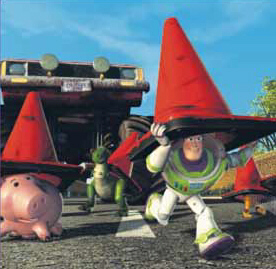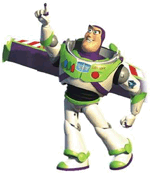Don't Hide
From Linear Combinations...

Buzz Lightyear
Will Save The Day!
Don't Hide
From Linear Combinations...

Buzz Lightyear
Will Save The Day!
|
If all variables have coefficients other than 1, we can use the multiplication and addition properties to find a combination of the linear equations that will eliminate a variable and this method is known as linear combination. |
 |
|
Equations:
|
We can eliminate the y-variable if the 3y in the first equation were -6y. Therefore, we multiply both sides of the first equation by -2. 3x + 3y = 15 -2(3x + 3y) = -2(15) -6x - 6y = -30 -6x - 6y = -30 2x + 6y = -22 The two y's die
and your left with:
Substitute 2 for
x in either of the original equations
Solution of this
system:
Now you can plug
in the x and the y in either of the original equations and check your answer!
|
Here
Are Five Practice Problems:

Quote From Rex
& Buzz Lightyear:
"Wow! I didn't
know this could be so easy!"
|
|
|
| 1. 3x - 5y = 13
x - 2y = 5 |
|
| 2. 7x + 2y = -1
3x - 4y = 19 |
|
| 3. x + 2y = 6
5x + 3y = 2 |
|
| 4. 2x + 3y = 7
3x + 4y = 10 |
|
| 5. 5x - 3y = 16
4x + 5y = -2 |
|
Are you still
having trouble?
Mr. Ham has
some steps that might help!

Steps For Using Linear Combination:
1. Write both
equations in the form Ax + By = C
2. Clear
any decimals or fractions.
3. Choose
a variable to eliminate.
4. Make the
chosen variable's terms additive inverse by multiplying one or both equations
by a number.
5. Eliminate
the variable by adding the equations.
6. Substitute
to solve for the remaining variable.